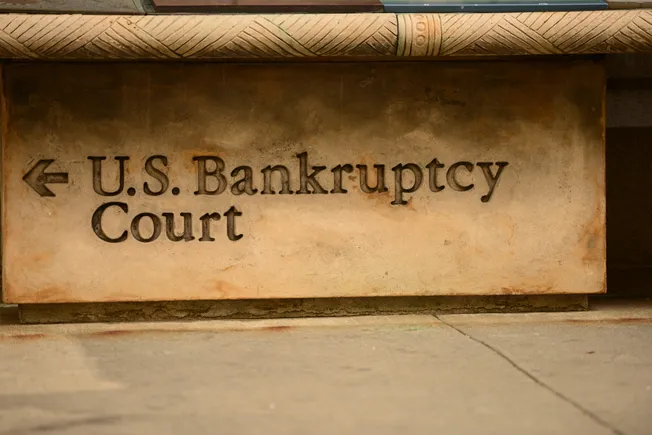Banking-as-a-service startup Solid Financial Technologies filed for Chapter 11 bankruptcy protection and restructuring in a Delaware court last week, following a challenging few years.
Solid has used equity funding to raise capital for operations But since the last fund-raise in July 2022, the fintech “has not been able to successfully raise additional funds and has faced significant and costly litigation,” the company’s CEO and co-founder, Arjun Thyagarajan, wrote in the filing.
A lawsuit filed by Solid investor FTV Capital in the Delaware Court of Chancery claimed, among other things, that Thyagarajan and co-founder Raghav Lal deceived FTV regarding Solid’s “revenues, customer churn, and business generally,” TechCrunch reported in October 2023.
FTV also claimed that both co-founders concealed what they were doing and sent a cease-and-desist letter to their head of finance, who FTV said was sharing information with the firm.
As of the bankruptcy filing date, Solid has roughly $760,000 in unsecured trade debt with a limited amount of current revenue, and roughly $7 million in cash on hand, of which roughly $2 million is held in nonliquid reserve accounts.
Through the Chapter 11 case, Solid aims to cut down the legal expenditures that have “grown significantly after the FTV litigation,” sell the fintech’s valuable assets – its application programming interface – and create a Chapter 11 plan after a sale process, the court document said.
“After considering all options, we’ve decided that a voluntary Chapter 11 restructuring is the best course,” Thyagarajan told TechCrunch, expressing optimism that the court-supervised sale process would attract an appropriate buyer, resulting in favorable outcomes for the company, its customers, and shareholders.
Solid plans to maintain normal business operations throughout this restructuring process, he said.
Challenges in the bank-fintech space
Solid’s bankruptcy filing comes roughly a year after middleware fintech provider Synapse filed for bankruptcy in April 2024. After Synapse’s bankruptcy, roughly $85 million in customer funds were missing.
Since then, the bank-fintech partnership space has come under heightened scrutiny. In a recent letter, Sen. Elizabeth Warren, D-MA, pressed Michelle Bowman, the nominee for the Federal Reserve’s vice chair for supervision, on why the central bank “failed to prevent the disastrous blow-up” of Evolve Bank & Trust’s partnership with Synapse that led to the missing funds. Coincidentally, Evolve was also Solid’s bank partner from 2021 to 2023. Since Synapse’s collapse, Evolve has been hit with an enforcement action and lawsuits, and has seen fintech partners pivot to other banks.
Solid plans to use cash on hand to facilitate its bankruptcy and believes its case and the marketing process will help sell its assets to the highest bidder, Thyagarajan said.
The fintech decided to pursue Subchapter V because it imposes shorter deadlines for filing reorganization plans, grants greater flexibility in negotiating restructuring plans, and does not require the payment of U.S. trustee quarterly fees, according to a Justice Department webpage.
Solid did not immediately respond to a request for comment.
Solid’s decision was driven by regulatory shifts after the collapse in the cryptocurrency space that rendered the BaaS model and partnerships with banks “unsustainable”; the fraud allegations brought by FTV and a settlement that drained the fintech’s balance sheet; and the fintech’s inability to retain clients and key employees amid declining revenue and limited growth opportunities, according to the court document.
“There are challenges in the aggregator space that likely didn’t allow Solid to find a permanent partner bank and unfortunately their bankruptcy is a result of that,” Bob Hartheimer, a senior adviser at Klaros Group, said via email. “What this means is the bar has been raised not only for partner banks but also for third party providers such as aggregators, compliance, and risk management providers to the partner bank fintech ecosystem.”
Solid has raised roughly $81 million in venture capital over three funding rounds, including $63 million in August 2022, led by FTV Capital and Headline.
“Solid offers modern fintech infrastructure” and helps any company “become a fintech company by building on Solid,” Thyagarajan said at the time, dubbing his company the “AWS of fintech.”
Nearly a year after the fund-raise, FTV sued Solid over alleged breach of contract, fraud in the inducement, fraudulent concealment, breach of fiduciary duty, breach of the implied covenant of good faith and fair dealing and unjust enrichment.
Solid disputed the allegations, and the FTV litigation was dismissed with prejudice under a settlement.
Impact of the litigation
The allegations by FTV hampered Solid’s relationship with its partner bank, Lewis & Clark Bank. In the fall of 2023, the bank required the fintech to fund a $10 million security reserve and to abide by additional reporting requirements. However, the court document pointed out that the bank terminated the master services agreement between both companies last August.
Solid has four active clients with the bank, and that partnership is scheduled to end May 31.
Solid’s wholly-owned subsidiary, Solid India, is being wound down, with operations expected to cease by May 31. All Solid India employees have been informed and will be terminated by this date, the filing said. Solid India will continue providing essential services to Solid to meet contractual obligations to clients and the sponsor bank until the closure date.
The startup has been “involved with several governmental investigations and inquiries, cooperating fully with each respective governmental entity, including by providing requested documents,” the filing noted.
Solid has worked with 142 clients since its founding through the end of 2024. During this time, it maintained banking relationships with BBVA (2019-2020), Evolve, Citizens Bank of Weir (2022-2024, card issuance only) and Lewis & Clark Bank, the filing said.
No new client contracts have been signed in 2025, and Solid experienced the most significant client departures in late 2023 and early 2024, the filing said.
Solid counts three staff members now – the CEO, the president and the chief product officer – along with one independent contractor, the company’s former finance director. That compares with 23 employees in 2023.

